Comparative Study of Cross-Culturalism in Russia and Australia
VerifiedAdded on 2022/08/27
|5
|1065
|24
Report
AI Summary
This report offers a comparative analysis of cross-culturalism in business organizations, specifically contrasting the cultures of Russia and Australia. It leverages Hofstede's framework, focusing on the dimensions of individualism and collectivism to highlight key differences in work environments, employee expectations, and managerial practices. The report explores how Russia, with its collectivist tendencies, differs from the individualistic culture of Australia. It examines how these cultural nuances influence business operations, employee motivation, and overall organizational dynamics. The similarities, such as the use of humor in the workplace, are also highlighted. The analysis includes references to relevant research papers and studies.
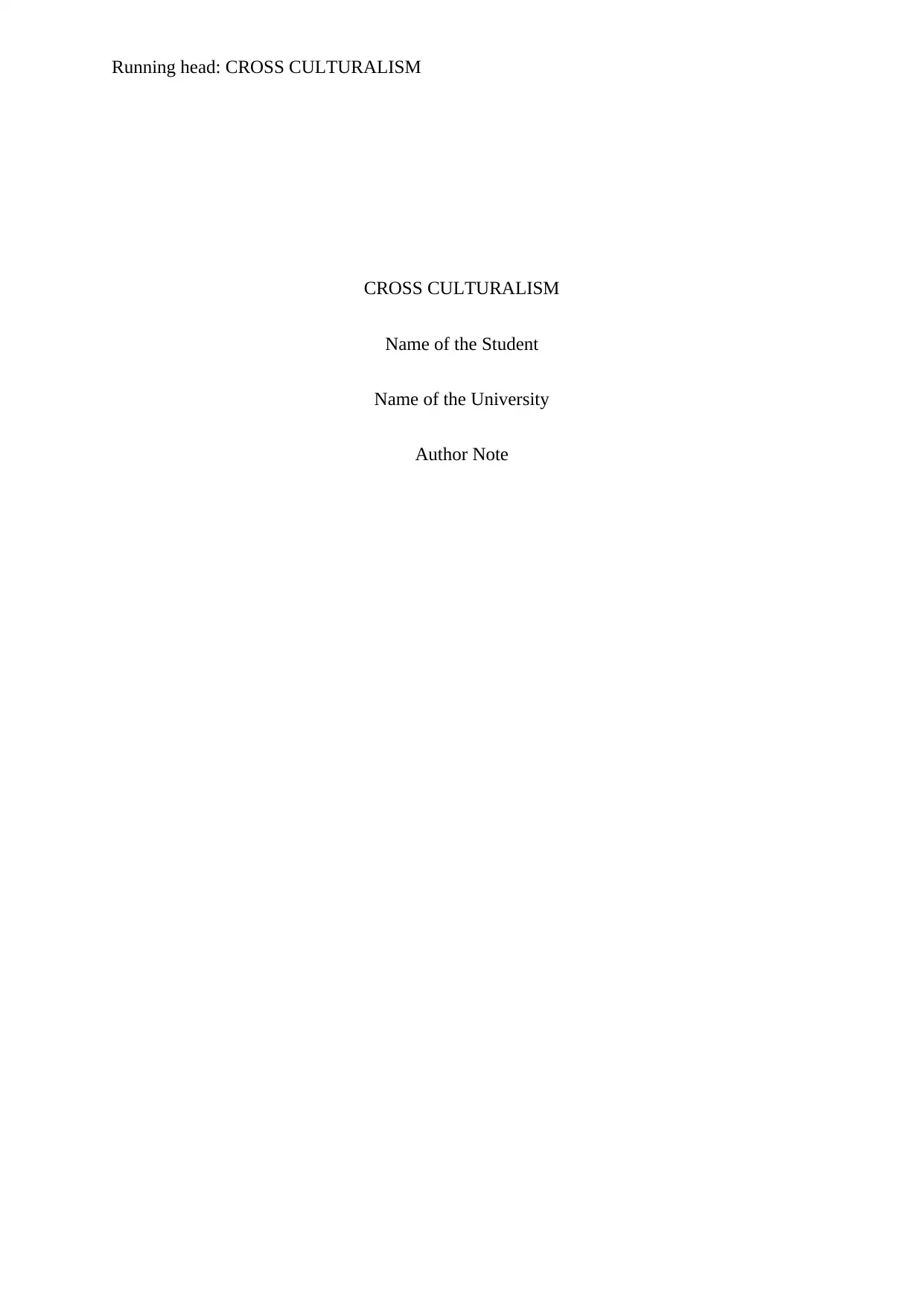
Running head: CROSS CULTURALISM
CROSS CULTURALISM
Name of the Student
Name of the University
Author Note
CROSS CULTURALISM
Name of the Student
Name of the University
Author Note
Paraphrase This Document
Need a fresh take? Get an instant paraphrase of this document with our AI Paraphraser
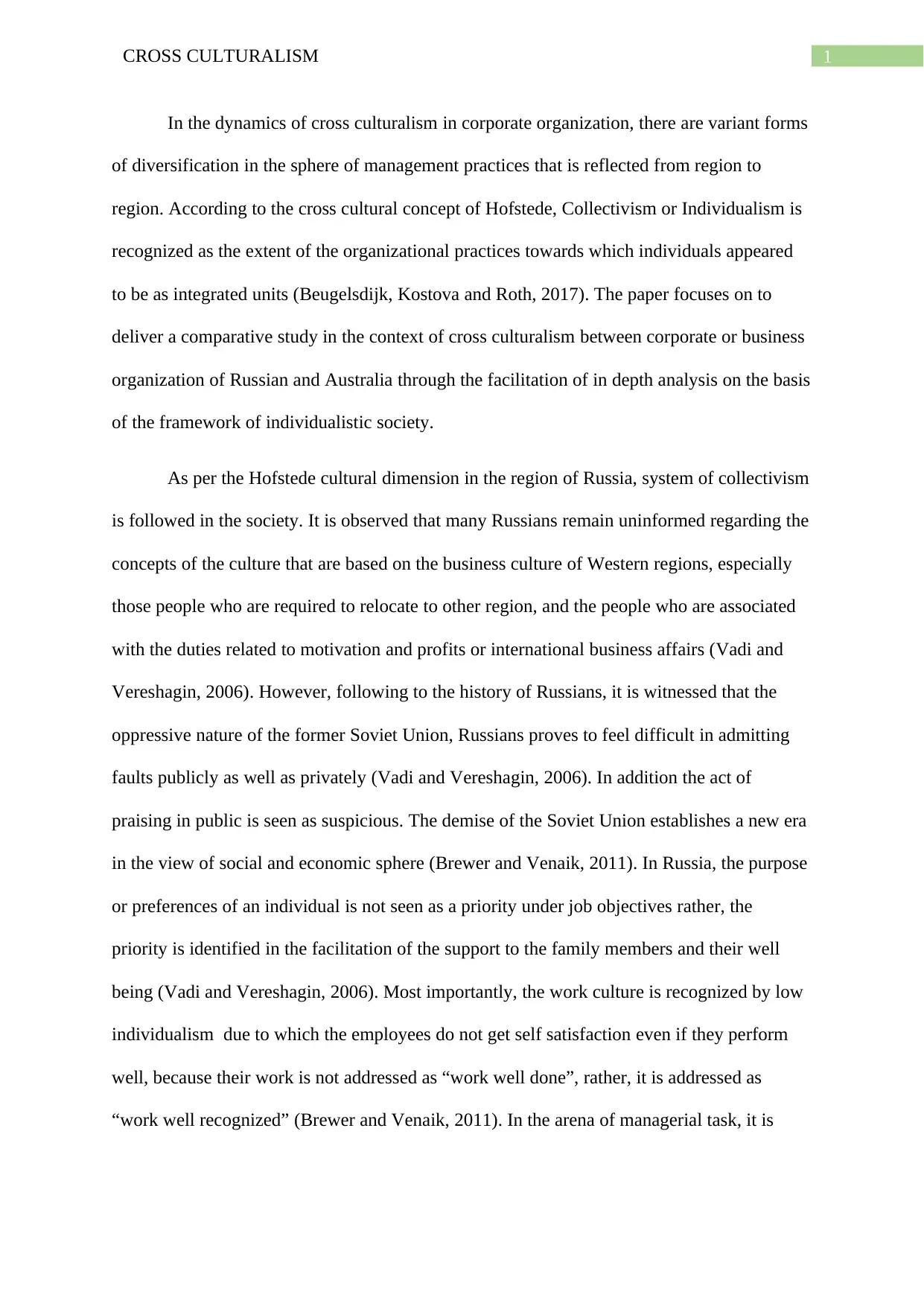
1CROSS CULTURALISM
In the dynamics of cross culturalism in corporate organization, there are variant forms
of diversification in the sphere of management practices that is reflected from region to
region. According to the cross cultural concept of Hofstede, Collectivism or Individualism is
recognized as the extent of the organizational practices towards which individuals appeared
to be as integrated units (Beugelsdijk, Kostova and Roth, 2017). The paper focuses on to
deliver a comparative study in the context of cross culturalism between corporate or business
organization of Russian and Australia through the facilitation of in depth analysis on the basis
of the framework of individualistic society.
As per the Hofstede cultural dimension in the region of Russia, system of collectivism
is followed in the society. It is observed that many Russians remain uninformed regarding the
concepts of the culture that are based on the business culture of Western regions, especially
those people who are required to relocate to other region, and the people who are associated
with the duties related to motivation and profits or international business affairs (Vadi and
Vereshagin, 2006). However, following to the history of Russians, it is witnessed that the
oppressive nature of the former Soviet Union, Russians proves to feel difficult in admitting
faults publicly as well as privately (Vadi and Vereshagin, 2006). In addition the act of
praising in public is seen as suspicious. The demise of the Soviet Union establishes a new era
in the view of social and economic sphere (Brewer and Venaik, 2011). In Russia, the purpose
or preferences of an individual is not seen as a priority under job objectives rather, the
priority is identified in the facilitation of the support to the family members and their well
being (Vadi and Vereshagin, 2006). Most importantly, the work culture is recognized by low
individualism due to which the employees do not get self satisfaction even if they perform
well, because their work is not addressed as “work well done”, rather, it is addressed as
“work well recognized” (Brewer and Venaik, 2011). In the arena of managerial task, it is
In the dynamics of cross culturalism in corporate organization, there are variant forms
of diversification in the sphere of management practices that is reflected from region to
region. According to the cross cultural concept of Hofstede, Collectivism or Individualism is
recognized as the extent of the organizational practices towards which individuals appeared
to be as integrated units (Beugelsdijk, Kostova and Roth, 2017). The paper focuses on to
deliver a comparative study in the context of cross culturalism between corporate or business
organization of Russian and Australia through the facilitation of in depth analysis on the basis
of the framework of individualistic society.
As per the Hofstede cultural dimension in the region of Russia, system of collectivism
is followed in the society. It is observed that many Russians remain uninformed regarding the
concepts of the culture that are based on the business culture of Western regions, especially
those people who are required to relocate to other region, and the people who are associated
with the duties related to motivation and profits or international business affairs (Vadi and
Vereshagin, 2006). However, following to the history of Russians, it is witnessed that the
oppressive nature of the former Soviet Union, Russians proves to feel difficult in admitting
faults publicly as well as privately (Vadi and Vereshagin, 2006). In addition the act of
praising in public is seen as suspicious. The demise of the Soviet Union establishes a new era
in the view of social and economic sphere (Brewer and Venaik, 2011). In Russia, the purpose
or preferences of an individual is not seen as a priority under job objectives rather, the
priority is identified in the facilitation of the support to the family members and their well
being (Vadi and Vereshagin, 2006). Most importantly, the work culture is recognized by low
individualism due to which the employees do not get self satisfaction even if they perform
well, because their work is not addressed as “work well done”, rather, it is addressed as
“work well recognized” (Brewer and Venaik, 2011). In the arena of managerial task, it is
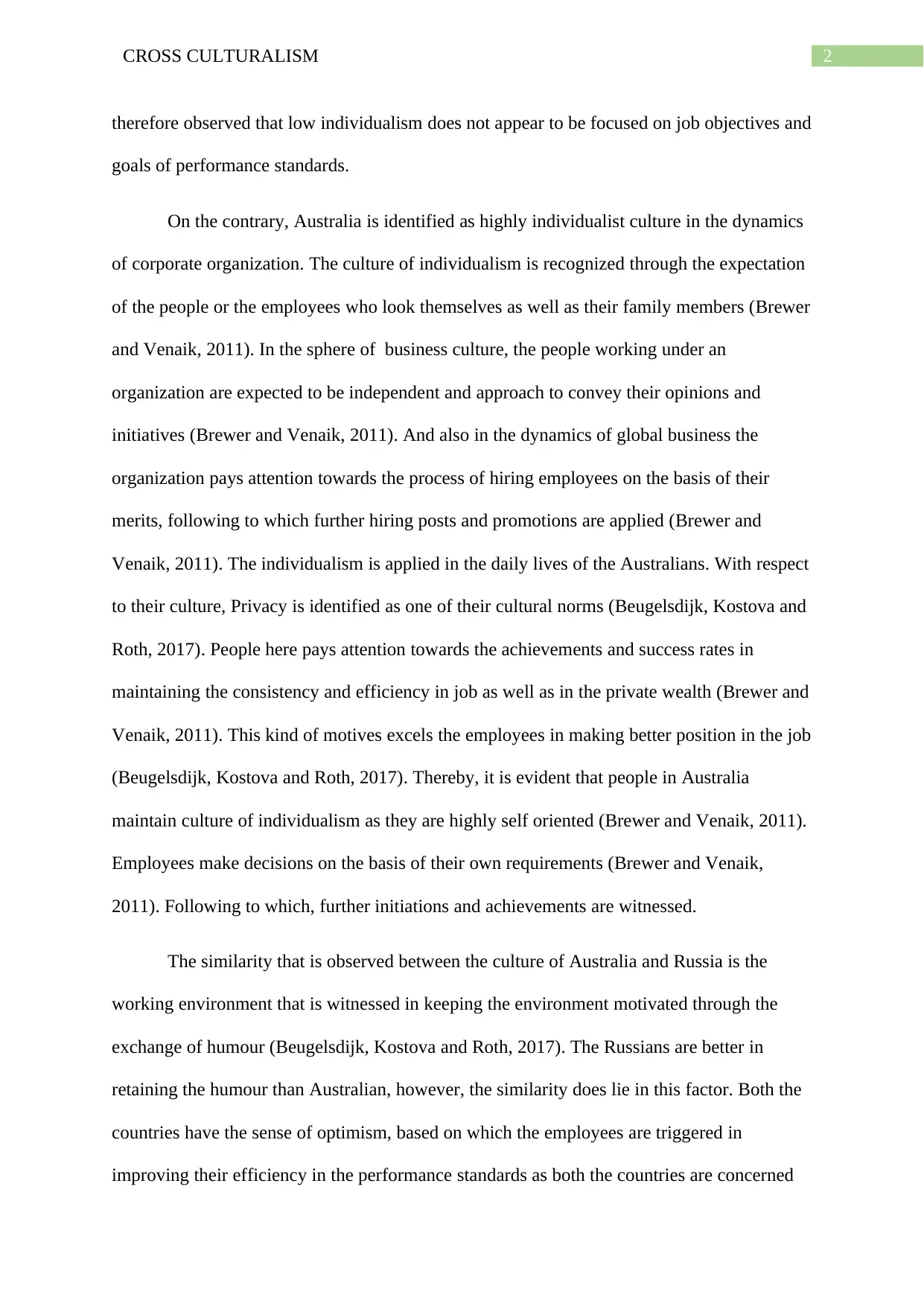
2CROSS CULTURALISM
therefore observed that low individualism does not appear to be focused on job objectives and
goals of performance standards.
On the contrary, Australia is identified as highly individualist culture in the dynamics
of corporate organization. The culture of individualism is recognized through the expectation
of the people or the employees who look themselves as well as their family members (Brewer
and Venaik, 2011). In the sphere of business culture, the people working under an
organization are expected to be independent and approach to convey their opinions and
initiatives (Brewer and Venaik, 2011). And also in the dynamics of global business the
organization pays attention towards the process of hiring employees on the basis of their
merits, following to which further hiring posts and promotions are applied (Brewer and
Venaik, 2011). The individualism is applied in the daily lives of the Australians. With respect
to their culture, Privacy is identified as one of their cultural norms (Beugelsdijk, Kostova and
Roth, 2017). People here pays attention towards the achievements and success rates in
maintaining the consistency and efficiency in job as well as in the private wealth (Brewer and
Venaik, 2011). This kind of motives excels the employees in making better position in the job
(Beugelsdijk, Kostova and Roth, 2017). Thereby, it is evident that people in Australia
maintain culture of individualism as they are highly self oriented (Brewer and Venaik, 2011).
Employees make decisions on the basis of their own requirements (Brewer and Venaik,
2011). Following to which, further initiations and achievements are witnessed.
The similarity that is observed between the culture of Australia and Russia is the
working environment that is witnessed in keeping the environment motivated through the
exchange of humour (Beugelsdijk, Kostova and Roth, 2017). The Russians are better in
retaining the humour than Australian, however, the similarity does lie in this factor. Both the
countries have the sense of optimism, based on which the employees are triggered in
improving their efficiency in the performance standards as both the countries are concerned
therefore observed that low individualism does not appear to be focused on job objectives and
goals of performance standards.
On the contrary, Australia is identified as highly individualist culture in the dynamics
of corporate organization. The culture of individualism is recognized through the expectation
of the people or the employees who look themselves as well as their family members (Brewer
and Venaik, 2011). In the sphere of business culture, the people working under an
organization are expected to be independent and approach to convey their opinions and
initiatives (Brewer and Venaik, 2011). And also in the dynamics of global business the
organization pays attention towards the process of hiring employees on the basis of their
merits, following to which further hiring posts and promotions are applied (Brewer and
Venaik, 2011). The individualism is applied in the daily lives of the Australians. With respect
to their culture, Privacy is identified as one of their cultural norms (Beugelsdijk, Kostova and
Roth, 2017). People here pays attention towards the achievements and success rates in
maintaining the consistency and efficiency in job as well as in the private wealth (Brewer and
Venaik, 2011). This kind of motives excels the employees in making better position in the job
(Beugelsdijk, Kostova and Roth, 2017). Thereby, it is evident that people in Australia
maintain culture of individualism as they are highly self oriented (Brewer and Venaik, 2011).
Employees make decisions on the basis of their own requirements (Brewer and Venaik,
2011). Following to which, further initiations and achievements are witnessed.
The similarity that is observed between the culture of Australia and Russia is the
working environment that is witnessed in keeping the environment motivated through the
exchange of humour (Beugelsdijk, Kostova and Roth, 2017). The Russians are better in
retaining the humour than Australian, however, the similarity does lie in this factor. Both the
countries have the sense of optimism, based on which the employees are triggered in
improving their efficiency in the performance standards as both the countries are concerned
⊘ This is a preview!⊘
Do you want full access?
Subscribe today to unlock all pages.

Trusted by 1+ million students worldwide
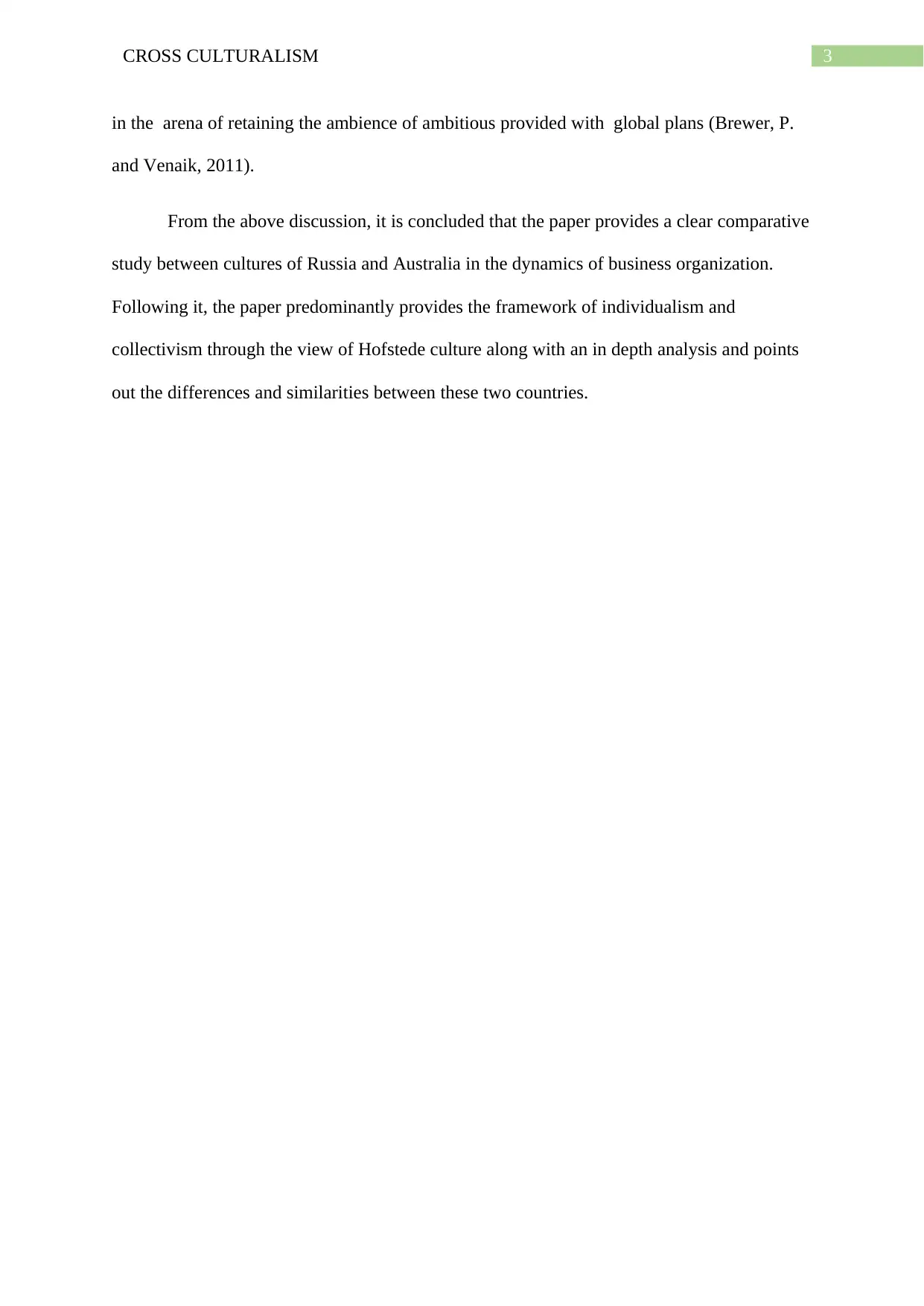
3CROSS CULTURALISM
in the arena of retaining the ambience of ambitious provided with global plans (Brewer, P.
and Venaik, 2011).
From the above discussion, it is concluded that the paper provides a clear comparative
study between cultures of Russia and Australia in the dynamics of business organization.
Following it, the paper predominantly provides the framework of individualism and
collectivism through the view of Hofstede culture along with an in depth analysis and points
out the differences and similarities between these two countries.
in the arena of retaining the ambience of ambitious provided with global plans (Brewer, P.
and Venaik, 2011).
From the above discussion, it is concluded that the paper provides a clear comparative
study between cultures of Russia and Australia in the dynamics of business organization.
Following it, the paper predominantly provides the framework of individualism and
collectivism through the view of Hofstede culture along with an in depth analysis and points
out the differences and similarities between these two countries.
Paraphrase This Document
Need a fresh take? Get an instant paraphrase of this document with our AI Paraphraser
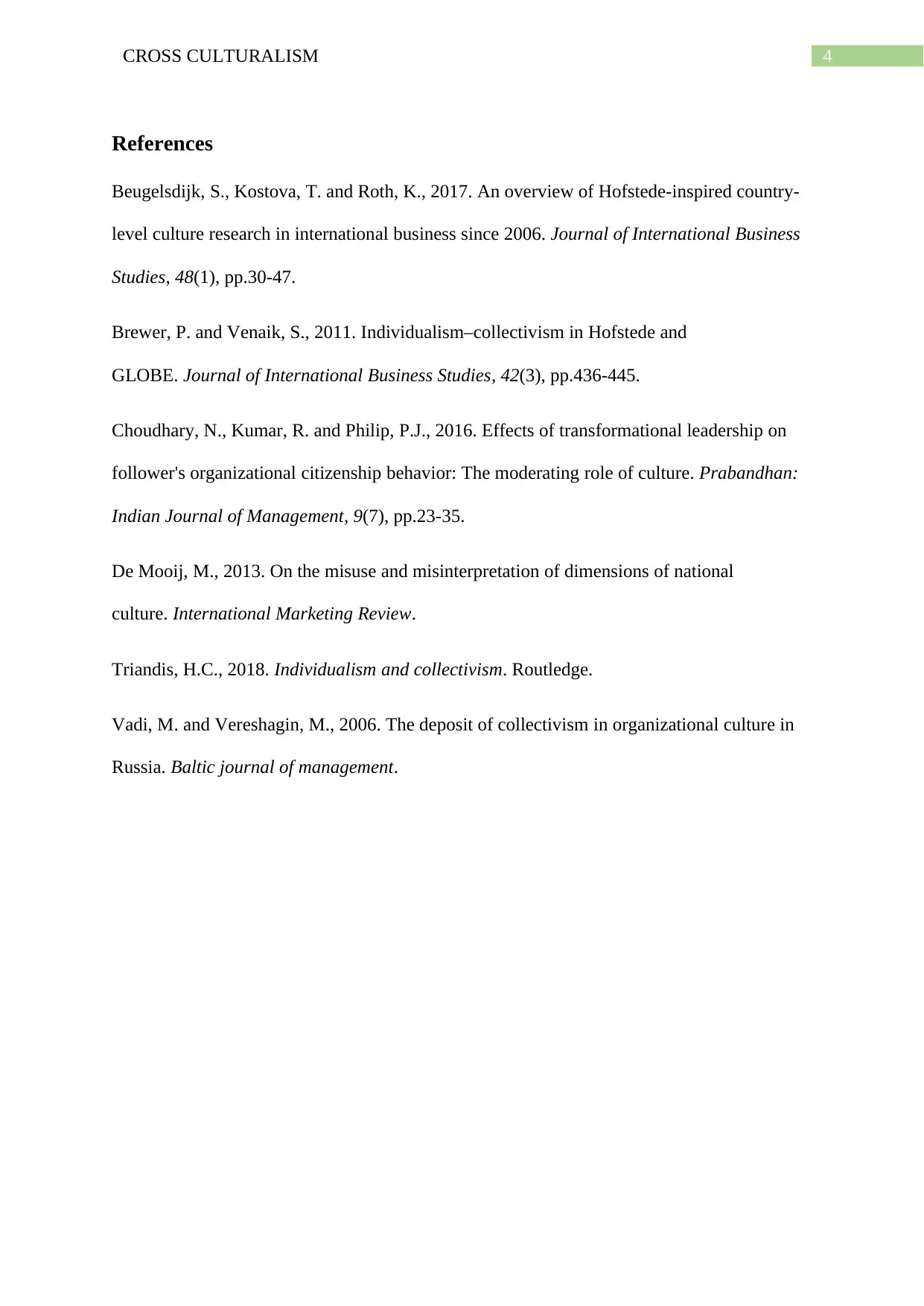
4CROSS CULTURALISM
References
Beugelsdijk, S., Kostova, T. and Roth, K., 2017. An overview of Hofstede-inspired country-
level culture research in international business since 2006. Journal of International Business
Studies, 48(1), pp.30-47.
Brewer, P. and Venaik, S., 2011. Individualism–collectivism in Hofstede and
GLOBE. Journal of International Business Studies, 42(3), pp.436-445.
Choudhary, N., Kumar, R. and Philip, P.J., 2016. Effects of transformational leadership on
follower's organizational citizenship behavior: The moderating role of culture. Prabandhan:
Indian Journal of Management, 9(7), pp.23-35.
De Mooij, M., 2013. On the misuse and misinterpretation of dimensions of national
culture. International Marketing Review.
Triandis, H.C., 2018. Individualism and collectivism. Routledge.
Vadi, M. and Vereshagin, M., 2006. The deposit of collectivism in organizational culture in
Russia. Baltic journal of management.
References
Beugelsdijk, S., Kostova, T. and Roth, K., 2017. An overview of Hofstede-inspired country-
level culture research in international business since 2006. Journal of International Business
Studies, 48(1), pp.30-47.
Brewer, P. and Venaik, S., 2011. Individualism–collectivism in Hofstede and
GLOBE. Journal of International Business Studies, 42(3), pp.436-445.
Choudhary, N., Kumar, R. and Philip, P.J., 2016. Effects of transformational leadership on
follower's organizational citizenship behavior: The moderating role of culture. Prabandhan:
Indian Journal of Management, 9(7), pp.23-35.
De Mooij, M., 2013. On the misuse and misinterpretation of dimensions of national
culture. International Marketing Review.
Triandis, H.C., 2018. Individualism and collectivism. Routledge.
Vadi, M. and Vereshagin, M., 2006. The deposit of collectivism in organizational culture in
Russia. Baltic journal of management.
1 out of 5
Your All-in-One AI-Powered Toolkit for Academic Success.
+13062052269
info@desklib.com
Available 24*7 on WhatsApp / Email
![[object Object]](/_next/static/media/star-bottom.7253800d.svg)
Unlock your academic potential
Copyright © 2020–2025 A2Z Services. All Rights Reserved. Developed and managed by ZUCOL.